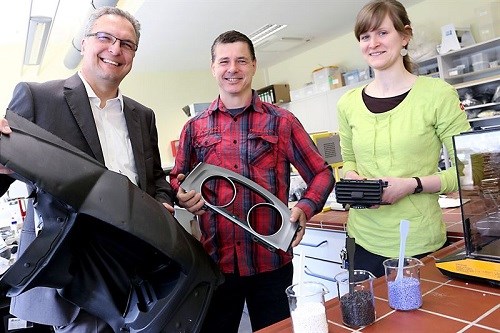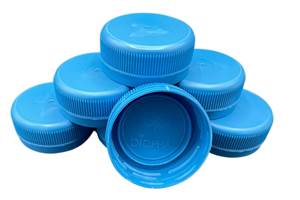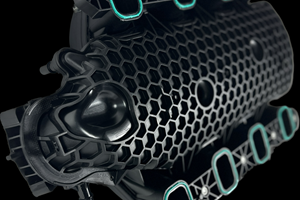Recycling of Plastic Auto Parts Gains Attention in Early Stages
SPI launches automotive recycling report; separation process key to German start-up’s patented recycling technology.
SPI launches automotive recycling report; separation process key to German start-up’s patented recycling technology.
There is a buzz about automotive plastics recycling these days, and I’ll bet that in the not-so-distant future we will hear about some of the advances being made. Last week I blogged about MBA Polymers starting up what appears to be the first production of PC/ABS pellets derived from shredded WEEE (waste electrical and electronic equipment).
But the company’s claim-to-fame is its now five-year-old Workshop, U.K. plant, which is reportedly the world’s largest (annual production capacity of up to 176 million lb) and most advanced facility for recovering plastics and rubber from automotive shredder residue. Its proprietary processes reportedly use less than 20% of the energy needed to produce virgin resins.
In a bit of serendipity, other news on this front emerged last week:
• SPI released its new report, Automotive Recycling: Devalued is now Revalued, which highlights innovative use of recycled content and achievements in zero waste in manufacturing, as well as promoting increased recycling of plastic automotive parts. At the same time, SPI noted the while automotive recycling is leading other industries—with 95% of automobiles recycled at the end of their practical life, the recycling of plastic materials in automobiles, is in its infancy.
SPI sees abundant opportunities for recycled plastic in cars. Each year in the U.S., about 12-15 million vehicles are scrapped with more and more plastic components and parts comprising an ever increasing amount of those vehicles. “There is an opportunity for recycled plastics in the automotive sector, and we are hoping to merge key learnings from all members of the supply chain together to learn how we can best promote and grow plastics recycling in the automotive industry,” said Kim Holmes, SPI’s senior director of recycling and diversion.
To help close the loop in automotive plastics, SPI has two projects underway. First, is the Zero Net Waste (ZNW) recognition program, which assists the plastics industry in managing waste in manufacturing by offering specific tools to evaluate waste reduction opportunities and maximize landfill diversion.
Second, in a separate recovery effort, SPI members have begun a collaborative research project to explore the viability of collecting and recycling auto plastics from end-of-life vehicles and build a basic recovery model for whole parts before shredding. The review will help determine the feasibility of recovery today pared against material performance and demand for recycled PP and TPO. If successful, the project will serve as a launching point to explore the opportunity to recover additional plastics, both through whole-parts recovery and eventually auto shredder residue (ASR).
• The engineering and technical center PulverMetallurgische Kompetenz-Centrum Thale (PMC), located in the German federal state Saxony-Anhalt and globally respected for its expertise in powder metallurgy, is expanding its work to encompass the recycling of automotive plastic waste into high-quality material. Each month, Volkswagen which is among PMC’s development partners, has been bringing two to three containers of plastic waste to the PMC, according to Thomas Kock, PMC’s managing director. He adds that there is great industrial demand for production processes that save energy and material, especially in the automotive and aviation industries. Pointing out that automotive plastic waste is costly and adversely affects the environment, Kock notes: “from our experimental factory, visions take shape and set off out into the world.”
Today, at PMC’s “experimental factory”, you can find sacks filled with granulate derived from shredded and ground plastic automotive waste. Kock says, the technology involved is ground-breaking, noting that this granulate can be used again without a decrease in quality, compared to most plastics which are thermally recycled or recycled in an inferior way which causes a drop in the material’s quality.
A team led by inventor Jorg Beckmann developed new processing procedures at the PMC with which it is reportedly possible for the first time to add prepared plastic wastes to fresh mixtures that are almost 100% new. Last year, this patented invention was awarded the Hugo Junkers Prize for Research and Innovation from Saxony-Anhalt. Chemical lab assistant Nicole Mahnke and chemical engineer Jurgen Deinert are key to this project, and are now part of the recently founded start-up company Seco Thale GmbH, which is one of PMC’s tenants. “Our tests are now going beyond the standard for laboratories,” says Deinert, noting that the internally developed processing line in the experimental factory acts as a technical center for further optimizing processes and end products.
It turns out that the heart of this invention is the separating process. Whether it be dashboards, surrounds or ventilator blades—different plastics are always processed. So far, PP, PUR and PVC have been separated from each other by means of the new technology.
The granules are of different color—black, white, blue, depending on the initial product or they are colored before they are made into new injection molded parts, according to Mahnke. In addition to the patented separation technology, new testing and measuring systems have advanced this research by confirming the high quality of the resultant recycled automotive plastics.

Related Content
Latest Data on Bottled Water Shows Continued Strong Growth
Bottled water’s volume surpassed soft drinks for the first time in 2016 and has done so every year since.
Read MorePHA Compound Molded into “World’s First” Biodegradable Bottle Closures
Beyond Plastic and partners have created a certified biodegradable PHA compound that can be injection molded into 38-mm closures in a sub 6-second cycle from a multicavity hot runner tool.
Read MoreICIS Launches: Ask ICIS Generative AI Commodities Assistant
Said to be the first of its kind, this AI assistant will enhance access to ICIS’ intelligence and insights for the energy and chemical markets.
Read MoreBASF Highlighting How They 'Make, Use and Recycle Future Solutions'
NPE2024: BASF is using its proprietary computer-aided engineering tool Ultrasim when designing for sustainability in a broad range of industries.
Read MoreRead Next
Making the Circular Economy a Reality
Driven by brand owner demands and new worldwide legislation, the entire supply chain is working toward the shift to circularity, with some evidence the circular economy has already begun.
Read MoreSee Recyclers Close the Loop on Trade Show Production Scrap at NPE2024
A collaboration between show organizer PLASTICS, recycler CPR and size reduction experts WEIMA and Conair recovered and recycled all production scrap at NPE2024.
Read More























